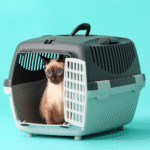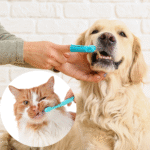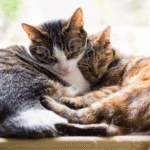Losing a beloved pet is one of the most profound emotional experiences a person can endure. Yet, for many, that pain is quietly endured, dismissed, or misunderstood. At The Parted Paw, we see every day how the loss of a companion animal can upend daily life, identity, and relationships. The love we share with our pets is real, and so is the grief that follows. When a friend, family member, or colleague loses a pet, the way we show up for them can either soften the pain or deepen their sense of isolation.
When Friends Want to Help
When someone close to us loses a pet, the instinct to comfort them is natural, but many people struggle with what to say or do. The first and most powerful act is simple acknowledgment. Say their pet’s name. Speak the loss out loud: “I’m so sorry about Bella.” “I know how loved Max was.” Silence or avoidance, however well-intentioned, can make the bereaved feel invisible.
Listening is the next essential act. True listening means resisting the urge to fix, compare, or minimize. Avoid platitudes like “She was just a dog” or “You can always get another one.” Instead, offer presence. Sit beside them, let them talk, and don’t rush their emotions. If they cry, let them. If they want to tell stories, invite them. Grief is a form of love still searching for expression.
Practical help can be a lifeline. The days after a loss often blur together. A friend’s thoughtful gesture—bringing food, helping remove pet supplies, or driving them to a cremation service—can provide real relief. Make your offers specific: “I can come by Thursday to help tidy up,” or “I’ll walk your other dog this week if that helps.”
As the weeks pass, don’t disappear. Continue checking in. Send a message on anniversaries, birthdays, or simply on quiet Tuesdays. The pain of pet loss rarely ends when the sympathy cards stop. Keep the connection alive by saying, “Thinking of you and Charlie today.” Small gestures like a framed photo, a candle, or a donation to an animal charity in the pet’s name remind the mourner that their companion mattered—and still does.
The Role of Family
Family reactions to pet loss can be complicated. One person’s grief may not be mirrored by others in the household, which can lead to frustration or resentment. The best gift family can offer is validation. Treat the loss with the same care you would any other bereavement. Phrases like “He was family to all of us,” or “Her presence filled our home,” create emotional permission to grieve openly.
Shared rituals can be deeply healing. Families might hold a small remembrance ceremony, plant a tree, light a candle, or create a memory shelf. Inviting children to participate in these rituals teaches them that love and loss coexist, and that grief is nothing to hide from.
Recognize, too, that everyone’s timeline for healing is different. One person may feel ready to welcome a new animal quickly, while another might not be ready for years. Respect each person’s process. If the bereaved asks for space, grant it. If they ask for conversation, give them your full attention.
Family members also play a critical role in noticing when grief becomes overwhelming. Prolonged insomnia, loss of appetite, or complete withdrawal may signal the need for extra support. Encourage professional help gently, without judgment. At The Parted Paw, we remind families that seeking grief support services is not a weakness—it’s an act of care.
Pet loss has a unique place within family systems because it touches routines, memories, and even identity. For someone who lived alone with their pet, the loss can feel like losing their primary relationship. Families should approach with empathy, not logic. This is not about replacing a pet; it’s about honouring a bond that helped shape who that person is.

Creating Compassionate Workplaces
Grief does not end when someone clocks in for work. Yet most workplaces have no framework for responding to pet loss. Employees who lose a beloved animal often return to their desks within days, expected to perform as if nothing has changed. This lack of acknowledgment compounds grief and can quietly erode well-being.
Workplaces that recognize the legitimacy of pet loss build loyalty and trust. Compassionate leadership begins with acknowledgment: “I’m so sorry to hear about your loss. Take whatever time you need.” A small sentence like that carries weight. It signals to the employee that their relationship mattered—that their pain is valid.
Flexibility matters too. Where possible, allow remote work, lighter duties, or adjusted schedules for a short period. The goal is not special treatment; it’s humane understanding. When companies allow people to grieve authentically, productivity and engagement often rebound stronger than before.
Organizations can also implement clear policies. Some employers now include pet bereavement days within their leave structures or extend Employee Assistance Programs to cover pet-loss counselling. These small shifts create cultural change.
For managers, education is key. Few people receive training on how to handle grief in the workplace, much less pet loss. The Parted Paw offers workshops and consulting to help teams develop this empathy-driven skill set. Leaders learn how to respond without awkwardness or avoidance, and colleagues learn how to provide quiet, appropriate support.
Even symbolic gestures, such as a communal sympathy card, a donation to an animal shelter, or a private message acknowledging the loss, can profoundly affect how an employee experiences their workplace after a pet’s death.
When workplaces normalize compassion, it changes everything. It reminds people that they are more than their job titles, and that their emotional lives are not liabilities but part of their humanity.
What Every Form of Support Has in Common
Whether you are a friend, a family member, or a manager, three principles apply universally:
Acknowledge. Say the pet’s name. Speak the loss aloud. Recognition breaks the silence that so often isolates grieving pet parents.
Listen. Allow them to tell stories and express emotions without rushing them toward “moving on.” Grief does not follow a timeline.
Follow through. Offer specific support, stay present, and remember that healing is cyclical. A message months later often means more than the first wave of sympathy.
Pet loss grief is not about replacing what was lost; it’s about learning to live with love in a new form. The bond remains, even when the physical presence does not.
At The Parted Paw, we have seen how communities transform when compassion becomes instinctive. When workplaces allow time, when families validate emotion, and when friends simply show up, healing begins.
Closing Thoughts
Grief for a pet is not a small grief—it is a sacred one. The animals we love witness our most private selves. They are our morning companions, our comfort during heartbreak, our constants in a world that changes too fast. When they go, the silence they leave behind can feel unbearable.
Our responsibility to those grieving is to honour that bond, to make space for it, and to say, without hesitation: this mattered.
If you or someone you know is grieving the loss of a pet, or if your workplace would like to develop compassionate policies to support employees through pet loss, The Parted Paw offers counselling, education, and organizational training dedicated to this very purpose.
Because when we show up with understanding, we remind each other that love never ends—it simply changes form.

Koryn Greenspan is a professional Certified Pet Loss Bereavement Specialist, Professional Dog and Puppy Trainer and a passionate advocate for pet wellness and holistic pet care.
As the founder of The Parted Paw, one of the first pet loss bereavement support services in the country, she is committed to raising awareness about pet loss as well disenfranchised grief and helping workplaces foster empathy and understanding for grieving employees who are anticipating or currently grieving the loss of a beloved pet.
More information about The Parted Paw and Koryn can be seen at www.thepartedpaw.com or on LinkedIn at www.linkedin.com/in/koryn Email: koryn@thepartedpaw.com








